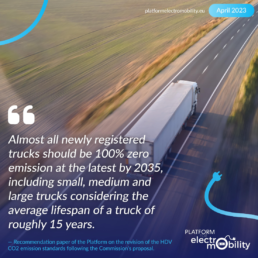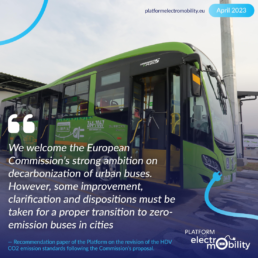Recommendation paper of the Platform on the revision of the HDV CO2 emission standards following the Commission’s proposal
The Platform for electromobility very much welcomes the proposal by the European Commission for revision of the CO2 standards for heavy-duty vehicles (HDV) and sees the regulation as a fundamental tool to electrify trucks and buses and thus advance the rapid roll out of zero emission vehicles (ZEV) in the road heavy transport sector. Currently, trucks and buses together make about 27% of the EU road transport emissions and trucks make up more than three quarters those. The proposal of the Commission for the revision of HDV CO2 standards falls short to align the CO2 targets for the sector with the EU’s overall -55% GHG reduction target in 2030 and the climate neutrality target of 2050.
In order to transition the road freight sector to zero emission, more ambitious standards are needed to set the right pace and a clear trajectory for manufacturers, logistics operators as well as for the supply chains in the electromobility and automotive industry. Scaling effects in production and technology development in the e-mobility and transport sector contribute to making electric HDVs more competitive and widespread.
Uniting ambitious green supply-side policy making with investments into cleantech industries, as done with the Net Zero Industrial Act, allows Europe to remain a climate leader whilst paving the way for thriving industries. The Platform calls on the European Parliament and Member States to notably strengthen the targets of the HDV CO2 standards, reducing emission, air pollution levels and setting pace for a greening road transport sector.
Almost all newly registered trucks should be 100% zero emission at the latest by 2035, including small, medium and large trucks considering the average lifespan of a truck of roughly 15 years. Non-regulated vehicles, such as vocational vehicles, should be put on a track to zero-emission by 2040 with the help of a ZEV mandate. Small trucks between 3.5-5t are possible to decarbonize within a few years as truck models are available and they can be operated without hurdles already today. These trucks are currently not part of the scope and should be included with a 100% ZEV mandate by 2030.
The Act should consider the demand for strategic raw materials across all e-mobility sectors. Batteries are of critical importance for the success of the EU Green Deal. The competitive environment in which battery manufacturers operate has evolved significantly since the first EU Battery Action Plan was developed in 2018. The Act offers the opportunity to update the EU Battery Action Plan and articulate the steps that Europe should take to support battery roll out.

The proposal’s new definition of zero emission (5 gCO2/tkm) creates a dangerous loophole for continuous sales of emitting vehicles even after 2050. The current definition requires trucks to emit less than 1 gCO2/kWh. The change of definition in the proposal allows for dual-fuel trucks running on 10% polluting diesel to be called zero-emission. The Platform strongly advocates to further only truly clean and future proof technologies and reverse the definition of ‘zero-emission’, and asks to keep it as it is (1 gCO2/kWh)

Sourcing should be both adequate and sustainable. The legislation should focus on ensuring an availability of supply that respects both human rights and environmental standards, regardless of the country of origin.
The global CO2 emission reduction targets for lorries as well as coaches should be significantly increased to align it with Europe’s 2030 climate target and market feasibility considering the sales targets by heady duty vehicle makers of up to 63% zero emission by 2030 . The proposed 2030 target of -45% is lacking ambition and is below what manufacturers have announced. It should be increased to an emission reduction level of at least 65%. An ambitious early target is key to breaking the cost barriers by unlocking rapidly improving battery technologies and by profiting from efficiency gains of ZEV series production.
The platform very much welcomes energy efficiency targets for trailers and semi- trailers as they will be a catalyst and accelerator for additional emission reductions.
An intermediary target should be included with a 70% ZEV mandate by 2027 considering that in 2022 30% of new buses in Europe were already zero emission , allowing city buses to move on a faster emission-free trajectory. As the bus target is counted towards the global CO2 emission reduction target, manufacturers have additional flexibility to reduce their emission by producing ZEVs in either of the categories – buses or coaches.
Two subcategories of urban buses, namely class II low-entry (i.e. 31L2 and 33L2), should be moved into the coach segment, as they are often used by local and regional authorities for longer distance public transportation. A usage that will be more difficult to decarbonize by 2030. In parallel, coaches, therefore including class II low-entry, should have the following CO2 reduction targets: 20% ZEVs by 2027, 60% by 2030 and 100% by 2035.
Policy makers need to create enabling conditions for transport operators and local and regional public authorities to transition to zero emission, such as sufficient funding opportunities for buses and infrastructure as well as assured grid reinforcements. In cases where recent investments into low-emission infrastructure have been made, an extended deployment of the existing bus fleets beyond their average lifetime can be made.
More clarity on the exemptions introduced by Article 3.b. would be needed as the content of the upcoming Delegated Act are not known yet and give the exemption a high level of unpredictability. The “maximum share of vehicles that a Member State can exclude” should be limited to the maximum level that does not jeopardize the strength and very meaning of the target. In addition, MS should strongly and objectively demonstrate and motivate the reasons for asking for the exclusions.
In order to help city councils and operators lower the cost of bus electrification, the best price-quality ratio criteria in the new public procurement procedures (article 3c) should include not only the provision of buses but also other services as the installation of the depots and on-road charging infrastructure and their operation and maintenance.

• The platform supports the Commission’s decision not to include a crediting mechanism for renewable and low-carbon fuels under this regulation. Under such a mechanism, manufacturers could continue to produce ICE vehicles and delay the transition to zero emission ones whilst not actually being able to control how fuels are being used in the end (and still being rewarded for it). In addition, incentivising these fuels are incompatible with EU efforts to increase efficiency and reduce energy consumption in HDVs.
• The ZLEV mechanism should be transformed into a ZEV only mechanism and as proposed phased out by 2030 when significant market ramp-up for zero emission trucks and buses can be expected.
• The possibility of transferring of zero-emission vehicles between non-connected manufacturers should be maintained. However, in order to create a large-enough market place for trading between manufacturers, co-legislators should remove the proposed 5% cap for receiving manufacturers.
• There should not be an exemption for small volume manufacturers as it is a contrary measure to reach carbon neutrality by 2050.
• The extension of the emission debts and crediting system from 2030 to 2040 gives additional flexibility to manufacturers to earn credits (when reducing emissions more than required) and use them to offset debts (if emissions are above what is required). Credits now can be used for 15 years to offset debts. Credit’s lifetime should have a maximum of 5 years as do the debts, have now. This would force to continuously investing in reducing their CO2 emissions.
• Protect the penalty scheme, which will force OEMs to take decarbonisation seriously. The currently existing excess CO2 emissions premium (penalty) should not be subject to the development of public infrastructure as many first-movers will aim for depot charging for their operations.
• Set a future-proof definition of long-range ZEHDVs. The European Commission proposed a threshold of 350 km as the definition for a long-range ZEHDVs. This should be increased to 450 km to accommodate the latest developments of improved battery designs that are offering longer ranges.
The ambitious charging infrastructure targets as finally adopted in the AFIR enabler a successful rollout of ZEVs. Additional private as well as public investments are needed to ensure higher grid capacity to serve the growing trucks and buses charging demand. The revenues from excess emission premiums should be channeled back into the sector for the roll out of the infrastructure network.
Investing in reskilling of workers is essential for both, those currently employed in the HDV manufacturing and therefore see a conversion of current skills, and new ones who will be increasingly specialized in new production value-chain. It can reduce social risk and increase labour resiliency. Other measures such as job-search assistance to jobseekers and income and early retirement support could make the transition more “just”.
The positive effects of electrifying trucks and buses are far-reaching and go beyond reducing Europe’s GHG emissions – accelerating the zero emission HDVs roll out also allows to drastically improve noise and air pollution. The high increase of energy efficiency in the case of BETs is particularly beneficial when road transport accounts for 29% of the EU’s final energy consumption[1]. The Platform for electromobility also wants to highlight that the transition to electric trucks and buses is a considerable opportunity for the European e-mobility value chain and the competitiveness of the economy. Ambitious targets would make Europe a leader in zero emission HDVs and thus further unlock the potential of the e-mobility value chain.
[1] https://theicct.org/transport-could-burn-up-the-eus-entire-carbon-budget/
